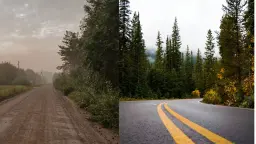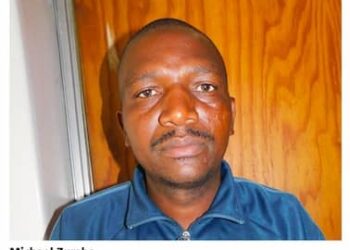Zimbabwe’s Minister of Transport and Infrastructural Development, Felix Mhona, has requested that rural communities provide a list of gravel roads that require repairs. He also asked them to specify the amount of fuel needed for the repairs. However, Mberengwa residents are expressing their desire for tarred roads instead. They believe that having tarred roads would be more beneficial and convenient for them.
Mhona, made the call during the question and answer session in parliament, on Wednesday while responding to Tinashe “Goga” Shumba, a member of the ruling party ZANU PF and a representative for Mberengwa Central. Shumba had raised concerns about the difficulty of travelling on these gravel roads during the rainy season, especially since they connect homes, clinics, and hospitals in rural areas. Shumba said:
My question is directed to the Minister of Transport and Infrastructural Development. What is the government policy on re-gravelling rural roads? There is the Rural Rehabilitation Programme.They are resurfacing roads, but they are not putting the gravel. During the rainy season, these roads are not accessible yet they lead us to critical public institutions like hospitals and clinics.
In response, Minister Mhona encouraged rural communities to communicate with the government through the Rural Infrastructure Development Agency (RIDA) and Rural District Councils (RDC). He mentioned that the ministry is considering taking additional measures instead of solely relying on their department for assistance. He said:We are saying let us reason together, do your compilation of the roads that you require to be graded and the amount of fuel that you require so that we start funding for fuel through your rural district council and through RIDA, so that you will also be in a position to rehabilitate your roads before the advent of the rains.
Gravel roads need to be maintained regularly, but according to Shumba, they are deteriorating further as the rainy season approaches. The minister agrees with Shumba’s concerns, stating that although they grade the roads, some of them have become weaker and need to be re-graveled first. However, he acknowledges that even after grading, the roads often end up in poor condition again when it rains.
Shumba’s question to the Minister of Transport, however, failed to inspire Mberengwa residents. One of those is Dr Takavafira Zhou, the president of the Progressive Teachers Union (PTUZ). He said:
I certainly don’t see any expertise in this question from an MP of Mberengwa that is rich in mineral resources and has nothing to show for this. The 3 Mps from Mberengwa (Tafanana Zhou, Tasara Hungwe and Shumba) must lobby for the tar macadimisation of our roads by companies looting our minerals such as lithium, chrome, lime, platinum, antimony, emeralds, copper etc. Apparently, Goga is just staying or mining adjacent to Chinese looting lime from Mberengwa. Why is he failing to move a motion in parliament at the plundering nature of Chinese and Kuvimba and the destruction of roads? Why is he and other MPs from Mberengwa not lobbying for local processing of lime, lithium, chrome, platinum, emeralds etc in order to add value to Mberengwa and beneficiation, I wonder?
Lithium Rush In Mberengwa: Police Order Miners To Vacate The Area
Woman Jailed 5 Years For Illegal Possession Of Emeralds
Mberengwa District, located at the border of three provinces – Midlands, Masvingo and Matabeleland South – faces a significant infrastructure challenge as it lacks tarred roads. In the 1990s, during Byron Hove’s era, there was an effort to tar the Mberengwa-West Nicholson road, a strategic route that would reduce travel distance for haulage trucks and buses heading to Zambia by nearly 100 kilometres. However, progress has been slow, with only 13 kilometres of the road being tarred until 2018 when construction resumed. Since then, an additional 22 kilometres have been completed, reaching Yorks township.
Mberengwa is known for its vast mineral resources, including lithium, chrome, lime, platinum, antimony, gold, and emeralds. However, despite mining activities by both local and foreign companies, the district remains one of the poorest in the country. This raises concerns about the equitable distribution of resources and the need for effective governance and transparency in the mining sector. It is essential for the government and relevant stakeholders to address these issues and ensure that the district’s mineral wealth translates into tangible development and improved living conditions for the local communities. Additionally, investing in road infrastructure would not only enhance transportation and connectivity but also open up opportunities for economic growth and development in Mberengwa and Zimbabwe at large.
Source Pindula News









